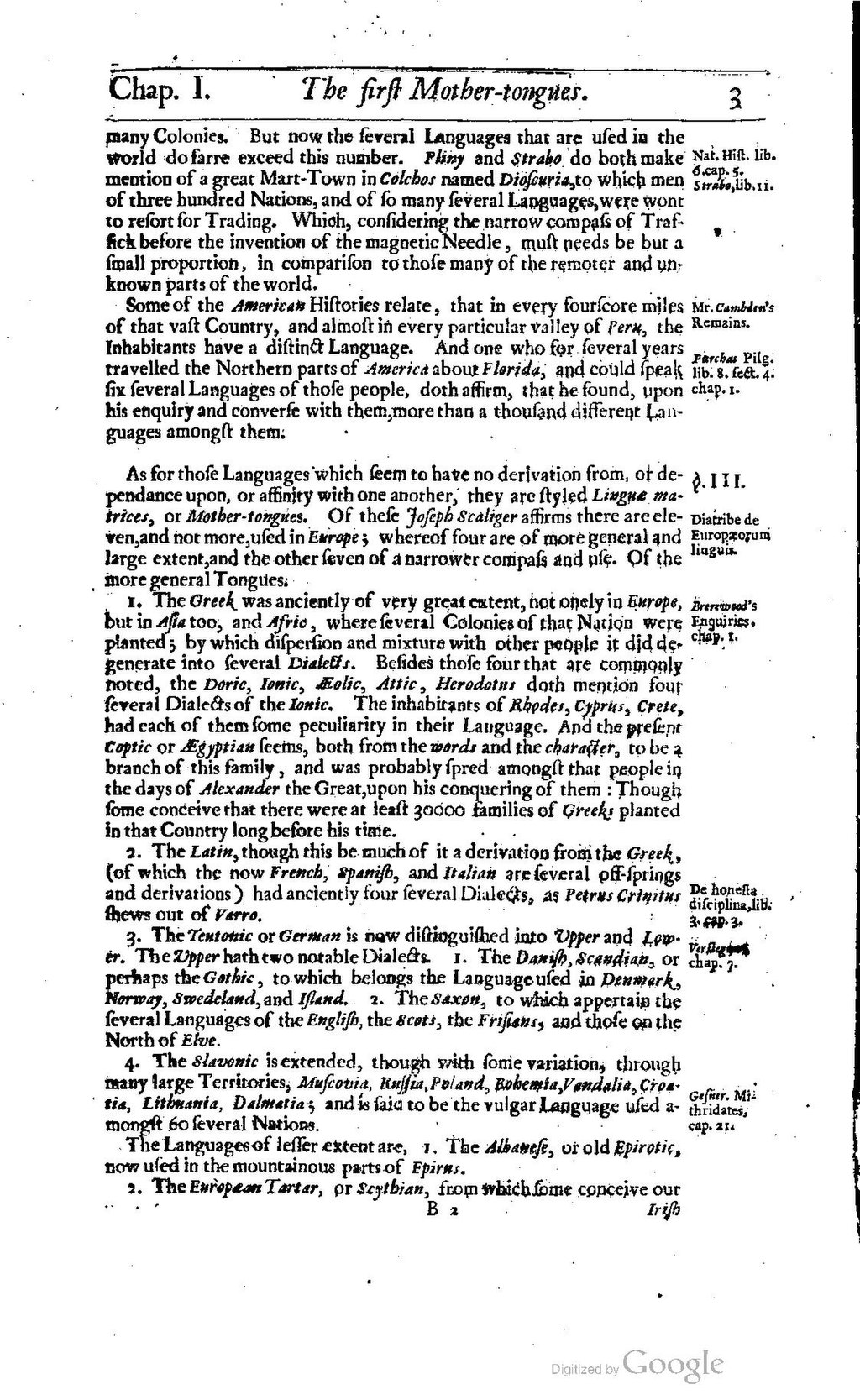many Colonies. But now the several Languages that are used in the world do farre exceed this number. Nat. Hist. lib. 6. cap. 5. Strabo, lib. II.Pliny and Strabo do both make mention of a great Mart-Town in Colchos named Diosouria, to which men of three hundred Nations, and of so many several Languages were wont to resort for Trading. Which, considering the narrow compass of Traffick before the invention of the magnetic Needle, must needs be but a small proportion, in comparison to those many of the remoter and unknown parts of the world.
Mr. Cambden's Remains.Some of the American Histories relate, that in every fourscore miles of that vast Country, and almost in every particular valley of Peru, the Inhabitants have a distinct Language. Purchas Pilg. lib. 8. sect. 4. chap. I.And one who for several years travelled the Northern parts of America about Florida, and could speak six several Languages of those people, doth affirm, that he found, upon his enquiry and converse with them, more than a thousand different Languages amongst them.
§. III.As for those Languages which seem to have no derivation from, or dependance upon, or affinity with one another, they are styled Linguæ matrices, or Mother-tongues. Diatribe de Europæorum linguis.Of these Joseph Scaliger affirms there are eleven, and not more, used in Europe; whereof four are of more general and large extent, and the other seven of a narrower compass and use. Of the more general Tongues:
Brerewood's Enquiries, chap. I.I. The Greek was anciently of very great extent, not onely in Europe, but in Asia too, and Afric, where several Colonies of that Nation were planted; by which dispersion and mixture with other people it did degenerate into several Dialects. Besides those four that are commonly noted, the Doric, Ionic, Æolic, Attic , Herodotus doth mention four several Dialects of the Ionic. The inhabitants of Rhodes, Cyprus, Crete, had each of them some peculiarity in their Language. And the present Coptic or Ægyptian seems, both from the words and the character, to be a branch of this family, and was probably spred amongst that people in the days of Alexander the Great, upon his conquering of them: Though some conceive that there were at least 30000 families of Greeks planted in that Country long before his time.
2. The Latin, though this be much of it a derivation from the Greek, (of which the now French, Spanish, and Italian are several off-springs and derivations) had anciently four several Dialects, as De honesta disciplina, lib. 3. cap. 3.Petrus Crinitus shews out of Varro.
3. The Teutonic or German is now distinguished into Upper and Lower. Versteg(illegible text) chap. 7.The Upper hath two notable Dialects. I. the Danish, Scandian, or perhaps the Gothic, to which belongs the Languages used in Denmark, Norway, Swedeland, and Island. 2. The Saxon, to which appertain the several Languages of the English, the Scots, the Frisians, and those on the North of Elve.
4. The Slavonic is extended, though with some variation, through many large Territories, Muscovia, Russia, Poland, Bohemia, Gesner. Mithridates, cap. 21.Vandelia, Croatia, Lithuania, Dalmatia; and is said to be the vulgar Language used amongst 60 several Nations.
The Languages of a lesser extent are, 1. The Albanese, or old Epirotic, now used in the mountainous parts of Epirus.
2. The Europæan Tartar, or Scythian, from which some conceive our